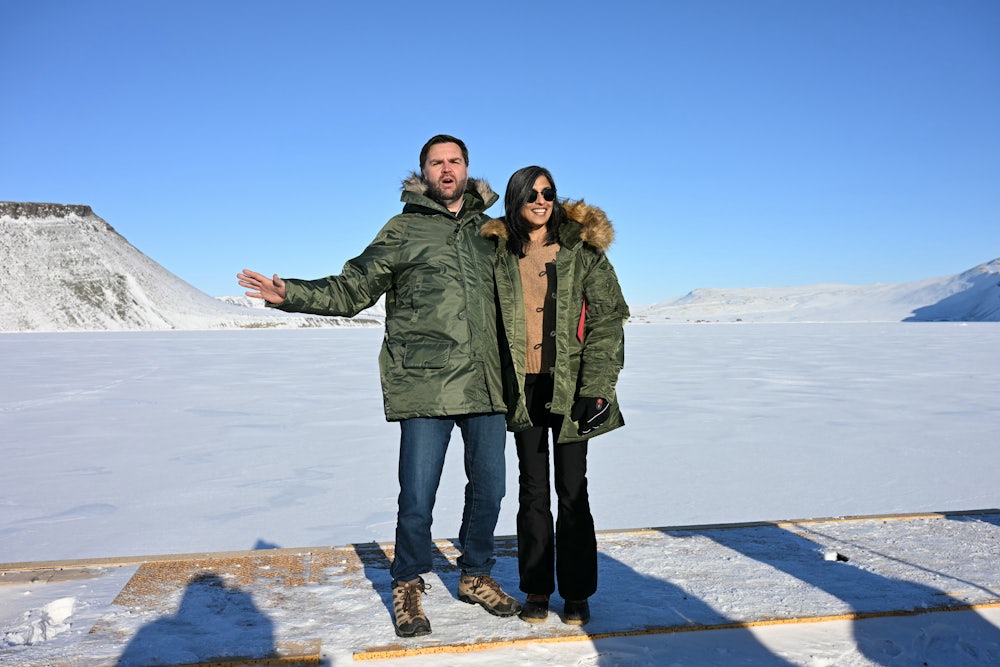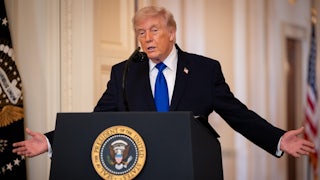Why is Denmark JD Vance’s white whale? In spinning up a diplomatic crisis with Denmark that recalls the geopolitical posturing that preceded World War I, the vice president is not just risking what’s left of the Pax Americana but scuttling global trade and destabilizing Europe.
Europe was already on tenterhooks with President Trump’s ill-conceived tariff blitz that he announced Wednesday. And Vance recently whined on a notoriously insecure group chat, “I just hate bailing out Europe again.” But the most immediate threat to Denmark is not tariffs or American neglect but the administration’s hurly-burly designs on Greenland, an autonomous Danish territory.
Vance’s wife, Usha, was supposed to take a ladylike cultural tour of Greenland last week, but officials in the region called her proposed trip a “provocation,” and she and her husband ended up stuck on a U.S. space base on Greenland’s northwest coast. There Vance leered at the “landmass,” as if Greenland were virgin land and not a division of a sovereign nation.
“Our message to Denmark is very simple: You have not done a good job by the people of Greenland,” he said bombastically. “You have underinvested in the security architecture of this incredible, beautiful landmass and its incredible people.”
Putting aside Vance’s fakey venture-capital language—“underinvested in security architecture”—the vice president elided the obvious fact that the United States is already pledged to defend Denmark and Greenland, just as Denmark, a founding NATO member, is pledged to defend the United States. That’s what “ally” means.
(“The U.S. shall not take over Greenland. Greenland belongs to the Greenlanders,” Danish Prime Minister Mette Frederiksen said Wednesday, as she stood in the capital city of Nuuk with Greenland’s Prime Minister Jens-Frederik Nielsen. Nielsen himself posted to Facebook: “Greenland is ours.”)
But Vance, who also advocates claiming the Panama Canal as American territory, is not just contemptuous of the U.S.-Denmark alliance. He’s actively trying to weaken Denmark. The country particularly bedevils Vance and others on the global far right, who see it as a leading avatar of the Europe they loathe and fear—the one that’s still faithful to the liberal orthodoxies that defined the West for seven decades.
In January, Vance horrified the audience at the Munich Security Conference when he proposed that Europe’s own liberalism, which grounded its defense of Romania against Russian hybrid warfare, among other actions Vance balked at, posed a greater threat to Europe than Russia or China.
Perhaps this is because avatars of European liberalism, notably Denmark, are a threat to Russia. Denmark’s defense spending comes in above the NATO-required 2 percent (it’s 2.4 percent, and the country has proposed raising it to 3 percent). And just last week, it pledged $140 million to companies that invest in Ukraine’s defense in its war with Russia. It has even created a “Danish model” of purchasing arms for Kyiv from Ukrainian producers.
Alexander Dugin, the far-right philosopher and adviser to Putin, took notice. On X, he condemned Frederiksen for her support for Ukraine: “It would be fair take Greenland out of her. She is murderer.”
And it’s got to addle Vance that even as Denmark upholds the principles of social welfare, the country is rich. Denmark’s per-capita gross domestic product is among the highest in the world; it rates well above the U.S. in quality of life. And in spite of its reputation for socialism, Denmark was ranked number seven on the Heritage Foundation’s list of countries by “economic freedom,” again well above the U.S.
At the helm of Denmark’s economic success is Novo Nordisk, the pharma company that makes Ozempic and Wegovy, blockbuster drugs for diabetes and obesity. With its all-time highest market cap in 2023 ($570 billion), Novo became Europe’s most valuable company for a time.
Novo’s controlling shareholder is the Novo Nordisk Foundation, the biggest altruistic organization in the world. While American institutions under the spell of Trump and Vance abandon even baseline civil rights, Novo Nordisk is still bullish on social justice, sustainability, and global health. Last year, the foundation committed $1.5 billion to 1,800 new global projects, including a collaboration with NVIDIA on an AI supercomputer that will accelerate research into drug discovery, quantum computing, and the green transition.
As it happens, Vance’s V.C. firm Narya invested some $617 million in a Novo Nordisk competitor between 2020 and 2023.
Kriya Therapeutics, a gene-therapy start-up founded by Shankar Ramaswamy (yes, he’s brother to Vivek), promises gene therapy for liver fibrosis. Kriya’s therapy has shown modest success in mouse models. In November, Novo Nordisk announced that Wegovy, which is already on the market for obesity, had significantly improved liver histology in humans in phase 3 testing for liver fibrosis. Novo’s once-weekly shot is simply further ahead in testing than Kriya’s therapy—and also more effective, already FDA-approved, and widely available.
On Wednesday, Europe’s pharma sector braced itself against U.S. tariffs. Novo’s leadership remained mum, but Ester Baiget, the chair of Novonesis, another successful Danish biotech company, spoke candidly of “decoupling” from the U.S.
But would decoupling be enough for Vance and his ilk? In their scheme to deprive Denmark of both treasure and territory is a less-than-stealth ambition to subjugate it outright. Carla Sands, Trump’s former ambassador to Denmark, described the Trump-Vance “commonsense” plan to annex Greenland as “a real threat to the Kingdom of Denmark because what makes them a major player is that they have … control of Greenland.”
Denmark does not believe it needs American forbearance, much less interference, to be a major player.
“Boykot Varer Fra USA”—“Boycott goods from the USA”— has almost 93,000 members who refuse to buy American goods in protest of U.S. bellicosity toward Denmark. In March, in the midst of a similar boycott and sell-off, Tesla new-car sales in Denmark fell by a vertiginous 65.6 percent.
Finally on Wednesday evening, the long-promised tariffs hit. Stocks tumbled in after-hours trading. Everyone was watching Europe.
But quietly, on the very same day, the Danish shipping company AP Møller-Maersk announced it had bought a railway connecting ports at either end of the Panama Canal. This undermines Trump’s other imperialist plan: to claim territory in Central America. Denmark, clearly, is not going down without a fight.






